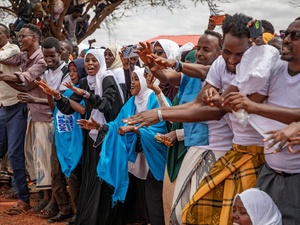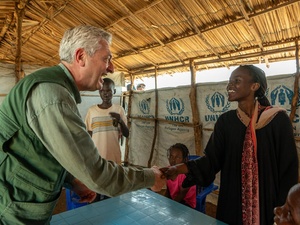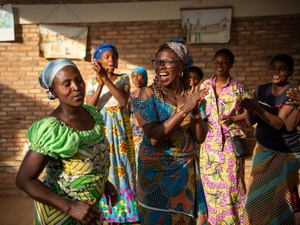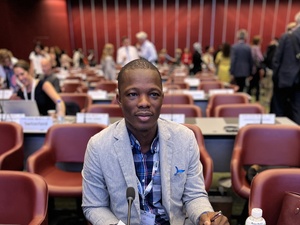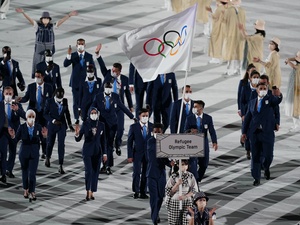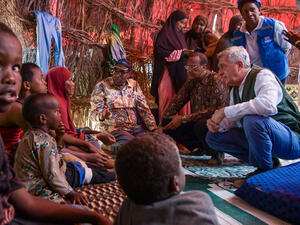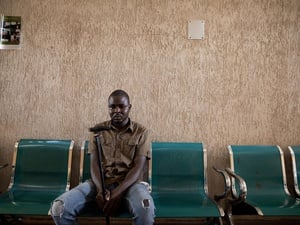UN High Commissioner for Refugees praises Latin America for its commitment to the inclusion of all those in need of protection
UN High Commissioner for Refugees praises Latin America for its commitment to the inclusion of all those in need of protection

UN High Commissioner for Refugees Filippo Grandi meets Venezuelan entrepreneur Jazhilmar Baez at an event in Quito, Ecuador.
Quito, Ecuador – At the end of a week-long visit to three Latin American countries, UN High Commissioner for Refugees Filippo Grandi applauded the region for its solidarity and commitment to protect refugees, asylum seekers and other displaced people.
“Latin American countries are facing an unprecedented level of displacement,” said Grandi. “Yet, they have stepped up to the challenge by showing unique generosity and dedication to find dignified solutions for those forced to flee.”
The Americas region is home to 20 per cent of the 82.4 million people forcibly displaced globally, including the second-largest external displacement crisis in the world – the 5.6 million refugees and migrants from Venezuela. As Latin America struggles to contain the COVID-19 pandemic, several countries have initiated large-scale regularization programmes to realize the full potential of displaced people and the contribution they can make to their communities.
“Inclusion is one of the most practical and concrete forms of protection. It helps children to get an education, people to receive the medical treatment they need, prevents exploitation and abuse and supports people to acquire the dignity of self-sustaining work,” explained Grandi. “Inclusion is the new protection.”
Grandi chose to mark World Refugee Day in Latin America as a recognition of the advances made by the region in the protection and inclusion of refugees and other displaced people.
“Countries like Colombia and Ecuador are taking brave and bold steps to leverage the full potential of refugees and others displaced. Latin American countries are an example to the world on how to protect people,” said Grandi.
Grandi started his trip in Panama where he participated in the International Donors’ conference for Refugees and Migrants from Venezuela. Panama has a long tradition of solidarity towards those forced to flee their countries and is home to over 2,500 refugees and about 13,000 asylum seekers from different countries. The High Commissioner also witnessed an event celebrating the power of youth to construct more welcoming societies focusing on common struggles, dreams and hopes.
In Colombia, the process announced by President Ivan Duque in February to grant temporary protection status to over a million Venezuelans, has already started. Grandi met the President and other national and local authorities and thanked them and the people of Colombia for this generous move, that will pave the way to the full inclusion of refugees and migrants from Venezuela. He also met with Venezuelan refugees and migrants to hear from them about their needs and concerns.
Grandi then travelled to Ecuador, where President Guillermo Lasso announced a new regularization process for Venezuelans in the country. Ecuador plays host to an estimated 430,000 Venezuelan refugees and migrants and has a long tradition of asylum and has recognized over 70,000 refugees, the majority from Colombia. In the capital, Quito, Grandi met the Vice-President and other government officials, members of civil society, including refugee and migrant associations. He also joined the private sector in the launch of a new strategy to integrate those forcibly displaced in the labour market in order to support their socio-economic integration.
“Refugees and others displaced can become real agents of change and contribute to the communities hosting them if given a chance and the tools to thrive,” Grandi said. “In this sense, the rest of the world can learn a great deal about the inclusion and integration of refugees in Latin America and the Caribbean.”
For more information please contact:
- In Colombia, Rocio Castaneda, [email protected], +57 314 411 54 31
- In Ecuador, Ilaria Rapido, [email protected], + 593 98 430 8666
- In Panama, Olga Sarrado, [email protected], +507 6640 0185
- In Panama, Diana Diaz Rodriguez, [email protected], + 507 6646 3469
- In Geneva, Aikaterini Kitidi, [email protected], +41 79 580 8334


